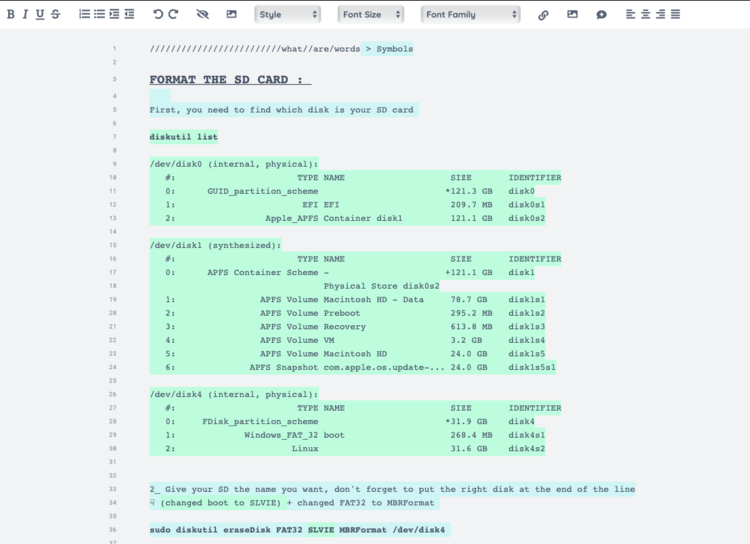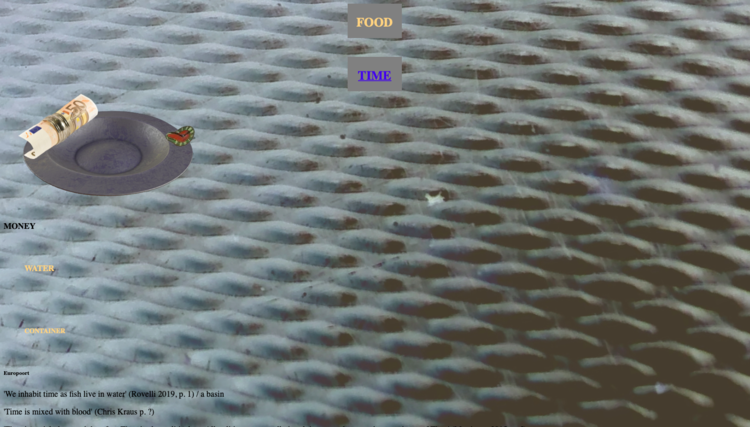User:Trashpuppy/GRAD: Difference between revisions
Trashpuppy (talk | contribs) No edit summary |
Trashpuppy (talk | contribs) No edit summary |
||
| Line 16: | Line 16: | ||
</div><br><br> | </div><br><br> | ||
The poetic inquiry consists of two aspects that in large provide the content for the website; the thesis and radio show <I>‘Dear Navigator’</I>. The listed locations are at the heart of the thesis framework. For a further elaboration on the significance of these location I refer you to the thesis outline.‘Dear Navigator’ is a radio show in collaboration with Cara Mayer Yepez and [https://goodtimesbadtimes.club Good Times Bad Times Radio]. With each episode we focus on a different physical location in Rotterdam, weaving together field-recordings, music, spoken word and discussions, to give rise to a sonic collage that speaks of memory, architecture, and political realities. We are currently developing the second episode on the Tweebosbuurt and Zalmhaventoren. The first episode | The poetic inquiry consists of two aspects that in large provide the content for the website; the thesis and radio show <I>‘Dear Navigator’</I>. The listed locations are at the heart of the thesis framework. For a further elaboration on the significance of these location I refer you to the thesis outline.‘Dear Navigator’ is a radio show in collaboration with Cara Mayer Yepez and [https://goodtimesbadtimes.club Good Times Bad Times Radio]. With each episode we focus on a different physical location in Rotterdam, weaving together field-recordings, music, spoken word and discussions, to give rise to a sonic collage that speaks of memory, architecture, and political realities. We are currently developing the second episode on the Tweebosbuurt and Zalmhaventoren. The [https://www.mixcloud.com/good_times_bad_times/dear-navigator-maastunnel/ first episode] focusses on the Maastunnel. The development of each episode takes about 1 or 2 months. Two of the episodes we will be developing over the course of this year focus on Delfshaven and the Europort. | ||
===<p><p style="color:black; font-family: Alike Angular; font-size: 20pt; font-weight: bold;">How do you plan to make it?</p>=== | ===<p><p style="color:black; font-family: Alike Angular; font-size: 20pt; font-weight: bold;">How do you plan to make it?</p>=== | ||
===<p><p style="color:black; font-family: Alike Angular; font-size: 20pt; font-weight: bold;">D®ive</p>=== | ===<p><p style="color:black; font-family: Alike Angular; font-size: 20pt; font-weight: bold;">D®ive</p>=== | ||
My motivation for this project has a lot to do with the fact that I wish history in general, but Dutch history specifically, would have been addressed and taught quite differently in school. The past informs the present. To uncover and critically assess this past I think is highly important as time is cyclical and historical patterns repeat themselves. The society we live in today is still very much formed on the same fundaments as 500 years ago. Nothing disappears, things only change shape. <br><br> | |||
The aspect of hyperlinking is important to me, as a way of organizing thought as well as sharing the employed research sources and tools. Additionally, it helps to connecting the stories of one place to that of another. While there are different forces at play in different places, some of the structures we find ourselves in are rather collective, global. Cross-referencing and looking for parallels for this reason can be very fruitful ground.<br><br> | |||
Why using the internet? Water and the internet are inextricably linked to one another. How the internet traces the sea floor, following the slave trade routes and old telegram lines, is rooted in memory. This is development and heritage, is at the core of some of the topics discussed on the website. I want to use the internet as a tool to reflect on this tension. | |||
=== Comrades for collaborating and communicating === | === Comrades for collaborating and communicating === | ||
The people from the Parallel Library Services can help me to figure out which digital tools exactly would work best to carry out this project. The interaction station / (digital) publication lab will be able to provide me with the necessary support to get the Rasberry Pi up and running as well as other technical questions with regards to coding.<br><br> | |||
I will be contacting OSP to help me out with some specific questions about the open-source code they provide. | |||
Additionally, I will consult some people from XPUB for advice and small demonstrations if necessary. | |||
===<p><p style="color:black; font-family: Alike Angular; font-size: 20pt; font-weight: bold;">Relation to previous practice</p>=== | ===<p><p style="color:black; font-family: Alike Angular; font-size: 20pt; font-weight: bold;">Relation to previous practice</p>=== | ||
As mentioned before, this project draws heavily on Dear Navigator that as a project aims to uncover and recover stories about places in Rotterdam. | |||
Last year, I focussed a lot on construction sites. I thought these places gave a glimpse of the city in motion. Uncovering the city as a palimpsest, a result of a constant process of writing and re- writing. While writing is erased, overwritten, or forgotten, it never really disappears. Over time different memories compete to come back to the surface. Where does a place start and where does it end? It stretches beyond merely the visible. This concept of the city as a palimpsest still very much underlies what I am doing with this project. Making the past writings (more) legible. This project in a way would function as a speculative recording device, for is writing history ever anything else? | |||
=<p><p style="color:black; font-family: Alike Angular; font-size: 20pt; font-weight: bold;">Prototyping</p>= | =<p><p style="color:black; font-family: Alike Angular; font-size: 20pt; font-weight: bold;">Prototyping</p>= | ||
===<p>RPi server set-up</p>=== | |||
[[File:Screenshot 2021-12-03 at 09.20.21.png|750px|center]] | |||
===<p>CSS HTML try outs</p>=== | |||
<br>First two tryouts of creating pages with HTML and CSS | <br>First two tryouts of creating pages with HTML and CSS | ||
[[File:Screenshot 2021-10-13 at 12.56.48.png|750px|center]] | |||
<br><br> | |||
[[File:Index.jpg|750px|center]] | |||
<br><br> | <br><br> | ||
===<p>References</p>=== | ===<p>References</p>=== | ||
Revision as of 14:47, 3 December 2021
Project proposal
Working title: A Sea of Thought
Intent and Content
I will create a website, a digital environment that functions as an infrastructure to share, activate and map out my research on the relationship of the Netherlands to water and the (built) environment. This takes the form of a poetic inquiry that takes various locations and events as points of departure. This project will be long term. For this year, I aim to build the skeleton of the website and a first utterance of content related to the following locations:
Rotta: The Deluge, a Dutch origin myth
Delfshaven: The Moon and the Market
Europort: Liquid land
NorthC (Datacenter): Clouded vision
The poetic inquiry consists of two aspects that in large provide the content for the website; the thesis and radio show ‘Dear Navigator’. The listed locations are at the heart of the thesis framework. For a further elaboration on the significance of these location I refer you to the thesis outline.‘Dear Navigator’ is a radio show in collaboration with Cara Mayer Yepez and Good Times Bad Times Radio. With each episode we focus on a different physical location in Rotterdam, weaving together field-recordings, music, spoken word and discussions, to give rise to a sonic collage that speaks of memory, architecture, and political realities. We are currently developing the second episode on the Tweebosbuurt and Zalmhaventoren. The first episode focusses on the Maastunnel. The development of each episode takes about 1 or 2 months. Two of the episodes we will be developing over the course of this year focus on Delfshaven and the Europort.
How do you plan to make it?
D®ive
My motivation for this project has a lot to do with the fact that I wish history in general, but Dutch history specifically, would have been addressed and taught quite differently in school. The past informs the present. To uncover and critically assess this past I think is highly important as time is cyclical and historical patterns repeat themselves. The society we live in today is still very much formed on the same fundaments as 500 years ago. Nothing disappears, things only change shape.
The aspect of hyperlinking is important to me, as a way of organizing thought as well as sharing the employed research sources and tools. Additionally, it helps to connecting the stories of one place to that of another. While there are different forces at play in different places, some of the structures we find ourselves in are rather collective, global. Cross-referencing and looking for parallels for this reason can be very fruitful ground.
Why using the internet? Water and the internet are inextricably linked to one another. How the internet traces the sea floor, following the slave trade routes and old telegram lines, is rooted in memory. This is development and heritage, is at the core of some of the topics discussed on the website. I want to use the internet as a tool to reflect on this tension.
Comrades for collaborating and communicating
The people from the Parallel Library Services can help me to figure out which digital tools exactly would work best to carry out this project. The interaction station / (digital) publication lab will be able to provide me with the necessary support to get the Rasberry Pi up and running as well as other technical questions with regards to coding.
I will be contacting OSP to help me out with some specific questions about the open-source code they provide. Additionally, I will consult some people from XPUB for advice and small demonstrations if necessary.
Relation to previous practice
As mentioned before, this project draws heavily on Dear Navigator that as a project aims to uncover and recover stories about places in Rotterdam.
Last year, I focussed a lot on construction sites. I thought these places gave a glimpse of the city in motion. Uncovering the city as a palimpsest, a result of a constant process of writing and re- writing. While writing is erased, overwritten, or forgotten, it never really disappears. Over time different memories compete to come back to the surface. Where does a place start and where does it end? It stretches beyond merely the visible. This concept of the city as a palimpsest still very much underlies what I am doing with this project. Making the past writings (more) legible. This project in a way would function as a speculative recording device, for is writing history ever anything else?
Prototyping
RPi server set-up
CSS HTML try outs
First two tryouts of creating pages with HTML and CSS
References
https://homebrewserver.club/fundamentals-port-forwarding.html
http://eth.leverburns.blue/p/clax&Syl___-rpi Documentation RPi set-up
http://osp.kitchen/tools/ethertoff/#project-detail-readme Etheroff: wiki consisting of Pads



